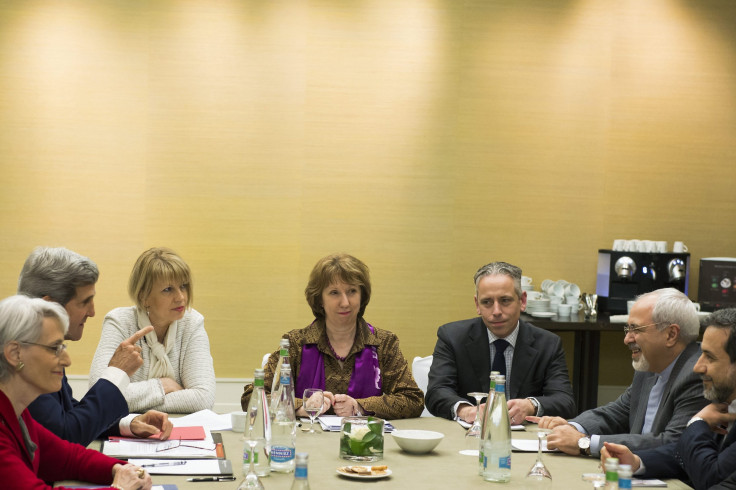US Must Reconsider Its Approach To Iran, Which Has Been Far Too Conciliatory

The month of March marked two occasions for the nation of Iran, where I was born. March 21 is the Iranian New Year. And just as with the New Year here in America, I always try to celebrate the event with a sense of hope and a true belief that things will change and it will finally be safe for me to go back to visit Iran and speak my mind in public without fear of reprisal.
Interestingly, March 21 also marked the end of nuclear talks between Iran and six Western powers, leading up to the July 20 deadline for a final agreement. Equally interesting, and unlike the occasion of the New Year, this fact does not fill me with very much hope. My youth in Iran made me well aware of what the regime of the yyatollahs is capable of. And knowing that, I fear that the U.S. and EU are drastically underestimating the situation.
The Obama administration in particular seems to be thoroughly committed to a soft approach to negotiations, and is far too willing to take the regime’s representatives at their word when they say that they will agree to a compromise. We should know from past experience that the Iranian government is not trustworthy on these issues. And we should know better than to attach too much significance to the fact that since last year Iran has been led by a new president. Hassan Rouhani was Iran’s chief nuclear negotiator 10 years ago when the West was bamboozled into believing that Iran would cooperate when in fact it was as committed as ever to enriching uranium and developing nuclear weapons technology.
U.S. policy towards Iran seemed firmer at the time, and yet neither the supreme leader nor the president seemed overly concerned about the possible consequences of their deception. I can only imagine how much more confident they must feel today, with the leaders of the U.S. and EU being so eager to lift the sanctions that were actually putting meaningful pressure on Iran. Since the situation already seems to favorable to the Iranian mullahs, I have been absolutely shocked to read that some Western participants in the negotiations have actually been advocating for an even softer approach.
One official remarked, "The U.S. and EU are being less than honest when they say that the ball is in Iran's court. After we bend, it becomes much easier for the Iranians to follow suit and secure a comprehensive deal.”
After we bend? I cannot understand why anyone would willingly bend to the desires of the theocratic regime that has been ruling my homeland with an iron fist for the past 35 years. Or maybe I can. That is, when I think back on the days after the Iranian Revolution, I understand why people bend to the pressure of a brutal regime when they are being tortured, or when their lives or the lives of their loved ones are in danger.
But that’s not the situation facing the Western powers. As of now, they have the opportunity to bring all the leverage to bear on the discussions. But if they give up too much and Iran turns out to have not been honest when it recommended compromise, then the disciples of the Ayatollah will get their hands on a nuclear weapon someday soon. And then the lives of people in the West and throughout the Middle East truly will be in danger.
Here in the U.S., the Iranian New Year calls for a new approach to policy toward the Iranian regime – not just with regard to the nuclear issue but with regard to everything. The soft approach ignores the fact that human rights abuses are still rampant in the country, that it still has the world’s highest per-capita rates of execution, and that it still suppresses free speech and dissent.
Indeed, the US lately seems to have been ignoring those facts quite deliberately, as evidenced by its turning a blind eye to the members of the Iranian resistance living in Iraq, to whom the US government promised protection during the occupation, but then left stranded after the withdrawal. Fifty-two of those people were killed in Camp Ashraf last September. 3,000 more are living in Spartan conditions in Camp Liberty, seeking refuge anywhere else – anywhere that they aren’t subject to rocket attacks.
It was heartwarming to see the House Minority Leader Rep. Nancy Pelosi, D-Calif., joining our New Year celebration on Capitol Hill and underscoring the need for taking steps to ensure the safety and security of our loved one in Camp Liberty.
These political dissidents are people who managed to avoid bending to the will of the murderous Iranian regime. They chose exile over submission and kept on fighting against dictatorship. With a weak, conciliatory approach winning the day at the negotiating table, the American and European politicians and negotiators could stand to learn a thing or two from the strength of those resistance members. And if they would take them in as refugees, they would have an opportunity to do so.
Of course, when the US makes that gesture, it will have already changed its policy and taken up a clear position in favor of the foreign struggle for democracy, and against the duplicity and scheming of dictatorship.
Ross Amin is the vice president of the Organization of Iranian-American Communities
© Copyright IBTimes 2024. All rights reserved.





















